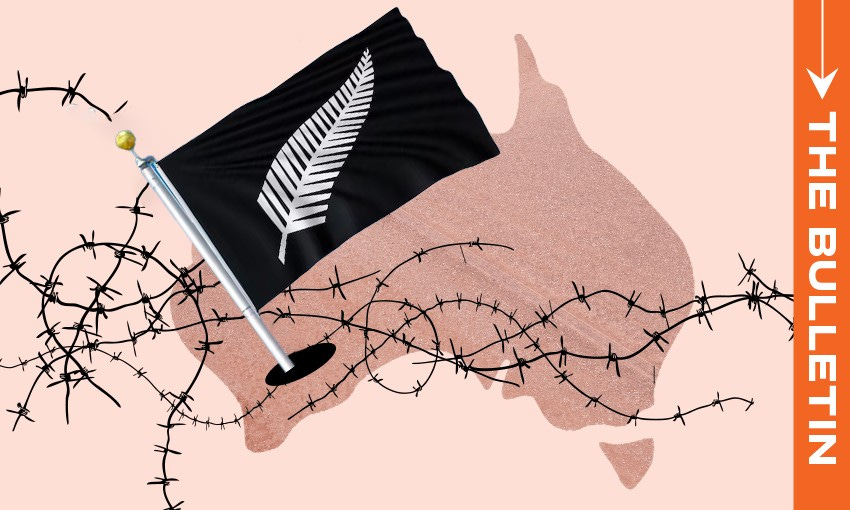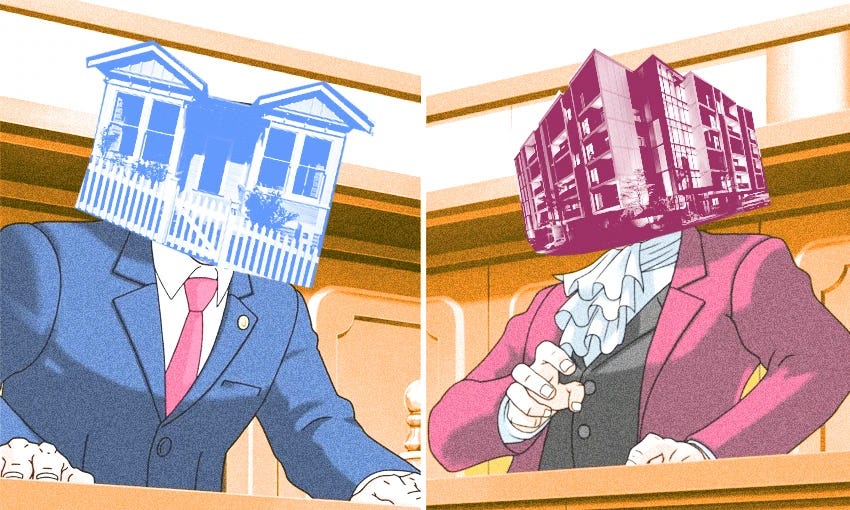Australia’s hardline deportation policy and what it means for the government
New polling shows crime is becoming more of a concern for New Zealanders.
Mōrena, and welcome to The Bulletin for Wednesday, June 12.
In today’s edition: Agriculture will be kept out of the ETS, Joe Biden’s son Hunter has been convicted in a US court, and a new survey highlights the impact of the cost of living crisis on New Zealanders’ savings. But first: what Australia’s renewed focus on deportations could mean for the trans-Tasman relationship.
A threat to our closest relationship
We talked yesterday about the diplomatic tightrope about to be walked by prime minister Christopher Luxon as he prepares to meet with one of China’s highest officials in Wellington. But there’s another diplomatic issue rearing its head, one that has already risked damaging our strongest global relationship. Last week it was confirmed that Australia would be toughening its stance on 501 deportations, as we touched on earlier in the week. The Spinoff’s Gabi Lardies has written a helpful explainer on what’s happened, explaining that “501s” has become shorthand for individuals deported from Australia under Section 501 of the Australian Migration Act, which allows a migrant’s visa to be cancelled if they fail a “character test”. It’s meant that thousands of people born in New Zealand but for all intents and purposes Australian have been sent back here, usually after being convicted of various, often minor, crimes. The 501 policy has been a thorn in the side of the trans-Tasman relationship, and today we’re going to look at why.
How we ended up here
Writing for The Post last week, Luke Malpass said that the problem of 501s at one point seemed confined to history. As he noted, the deportation scheme had been an issue for prime ministers John Key through Jacinda Ardern until a deal was struck in July 2022 to end the programme through something known as “direction 99”. That meant immigration officials would have to give weight to a potential deportee’s relationship with Australia before deciding to cancel their visa. But under pressure over a rise of would-be-deportees avoiding deportation, and after being accused of having a “sycophantic relationship” with Jacinda Ardern, Anthony Albanese has caved. As The Guardian reported, Australian immigration minister Andrew Giles announced new rules that emphasised community protection and “strengthening our cancellation system to better reflect community expectations”. The Science Media Centre has canvassed experts on Australia’s decision, with Auckland University’s Tim Fadgen saying the hardening position on 501 deportees is “surprising only in its apparently abrupt return to its earlier policy position”.
What this means
RNZ’s Jessie Chiang spoke to a woman facing possible deportation from Australia earlier in the week who said it was “devastating” to learn she may be forced out of the country she’s lived in since the age of six. "It's destroying lives, it's destroying families and we're all suffering." Newshub’s Emma Cropper had a similar story last week, speaking to a man in detention who moved from New Zealand to Australia at just seven months old. He’s facing deportation for causing a major crash after running a red light. As Cropper reported, no alcohol or drugs are alleged to be involved. "I've got no one at all in New Zealand, I've never been there, don't know anything about the place. I've lived my whole life here," the deportee said. Stories like this have been common in our media for the past decade. In 2022, The Spinoff’s Don Rowe examined some of the harm caused by the deportation policy up until that point, following on from a personal feature he had written four years earlier looking at one particular case. As Rowe noted, the increase in 501 deportations has been linked to an escalation in gang crimes, though this Stuff long read from 2022 is a helpful reminder that not all deportees are causing issues here. The Post’s Thomas Manch has reported that even though Australia softened its deportation programme for two years, the crime wave in New Zealand did not ease.
Crime is becoming more and more worrying for New Zealanders
When prime minister Christopher Luxon learned about Australia’s new stance on deportations, he told reporters: "It's just not right that people who have no connection to New Zealand are deported to New Zealand.” But beyond the morality, there’s a political concern for the coalition. In 2022, Luxon told TVNZ’s Breakfast that a “tough on crime” approach was needed for deportees who ended up bolstering crime in New Zealand. “They are creating much more misery, pain, they're peddling drugs. That's impacting all families across New Zealand,” he said.
Luxon and his coalition partners were elected last year with a tough on crime mantra, something he made clear on every stop of his nationwide pre-election tour. In recent weeks, the government has announced new prison funding and unveiled an anti-gang taskforce. Despite this, RNZ reported on a public meeting in Auckland where the police minister was confronted by frustrated locals. A recent Ipsos poll showed concern about crime had risen to become the second most important issue for New Zealanders, as Newshub’s Amelia Wade first reported, above healthcare and housing. A Curia poll for the Taxpayers’ Union released yesterday showed 21.8% of those surveyed put law and order as one of their top three issues. That same poll, as the Herald’s Thomas Coughlan reported, showed a closing gap between the left and the right, along with Chris Hipkins rising in popularity above Luxon.
Introducing Juggernaut: The Story of the Fourth Labour Government
In a new six-part series, Toby Manhire interviews more than 20 people at the heart of the momentous social, cultural and economic changes that resulted from NZ's pivotal 1984 snap election. Subscribe to make sure you get every episode.
Juggernaut was made with the support of NZ on Air.
Confirmed: Agriculture kept out of Emissions Trading Scheme
The coalition has done as it promised, keeping agriculture out of the Emissions Trading Scheme and scrapping the He Waka Eke Noa group. As RNZ’s Anneke Smith reported, a replacement working group – or Pastoral Sector Group – has been announced. Agriculture minister Todd McClay said the government will engage with farmers and processors to work on biogenic methane. "The primary sector worked collaboratively for years, however, Labour rejected many of its proposals compromising consensus, relationships, and confidence across rural New Zealand,” he said. You can hear McClay on today’s edition of The Front Page podcast, and he’s doing the media rounds this morning as well. Agriculture groups like Federated Farmers have welcomed the move, reported Newstalk ZB, though opposition parties have criticised the government for delaying climate action. The Science Media Centre has compiled some expert reactions to the announcement here.
What happens when disabled people lose flexible funding
The Spinoff’s Shanti Mathias has an excellent in-depth reported feature this morning on the funding changes at Whaikaha and the fallout. It all stems from a March 18 announcement from the Ministry for Disabled People that changed how disabled people and carers could spend their disability support funding. As Mathias succinctly puts it:
The announcement came via a Facebook post. It was midday on a Monday. There had been no consultation with disabled people and their carers, and the comments were promptly turned off. The changes were effective immediately.
Mathias has spoken to some of those affected by the announcement and advocating for change. “It makes me feel like I’m a third-class citizen in my own country. Our needs are not valued, our voices aren’t heard, and people don’t want to understand what our needs are,” said one person.
Join The Spinoff Members
“The Spinoff has given me my faith in good journalism back.” Anja, Spinoff member since 2020. If, like Anja, you value our work and want to support us, please consider becoming a member today. Already a member? Ka nui te mihi, your support means the world to us.
Click and Collect
RNZ’s Farah Hancock continues her reporting on the fast track bill and the potential implications, with Eden Park saying the proposed law could alow them to host more events at the stadium.
The Spinoff’s Alice Neville discusses the results of a new Kiwibank survey which highlights the impact of the cost of living crisis on New Zealanders’ savings.
We’ve all noticed petrol prices are going down. But, as Janika ter Ellen at Newshub reports, are they going down as quickly as they should be?
The billion dollar problems with Kāinga Ora and why plans to fix it might make the problem worse (paywalled).
The Commerce Commission has filed criminal charges against Kiwibank in the Auckland District Court, alleging systemic breaches of the Fair Trading Act.
Joe Biden’s son Hunter has been convicted of all three felonies in a trial that could have ramifications for the US presidential election.
The front page of The Post today has the latest Andrea Vance report on MPs claiming accommodation expenses.
The annual Fieldays kicks off today. As The Waikato Times reports, organisers are feeling positive.
Award-winning Kiwi film We Were Dangerous to open NZ International Film Festival.
As character housing protections go to court, Joel MacManus asks what a judicial review means for Wellington's new District Plan. Lucinda Bennett explores the community schemes that could create a better food system for Aotearoa. For The Cost of Being, a 19-year-old landscape gardener reveals the expense he doesn't regret - a fragrance subscription.
That’s it for The Bulletin today, thanks for reading. I’ll be back tomorrow morning.
Got some feedback about The Bulletin, or anything in the news? Get in touch with me at thebulletin@thespinoff.co.nz.
If you liked what you read today, share The Bulletin with friends, family and colleagues.














